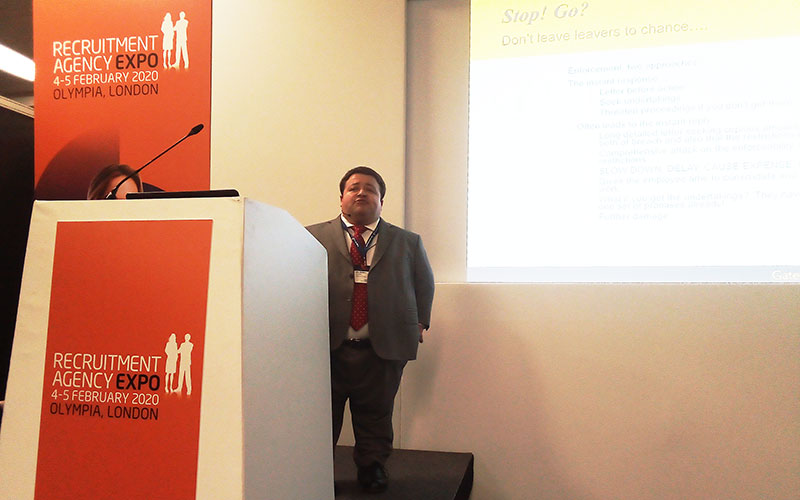Restrictive covenant breach? Don’t write a letter, get a search order

What is the best method to prevent former staff members from competing with you once they leave your business?
Neil Warner (pictured), partner at law firm Gateley, said agency leaders were altogether better off instructing their lawyers to apply for a search order instead of dashing off a threatening letter to an ex-member of staff to enforce a restrictive covenant clause.
Speaking at the Recruitment Agency Expo in London’s Olympia yesterday, Warner spoke about restrictive covenants, which are used by agencies to stop former members of staff from competing with their previous agency for a certain period of time.
Running through the range of options available to recruiters that suspect a former employee has breached their restrictive covenants, Warner revealed these can include instructing lawyers to write a letter asking the consultant to honour their restrictive covenants; going to court regardless of cost; attempting to get to the bottom of what has actually gone on; or simply doing nothing and writing the situation off as just something that happens in sales environments.
While a strongly worded letter can prove effective in getting former consultants to comply with restrictive covenants, Warner warns these can be responded to with long letters explaining precisely why the restrictive covenants aren’t worth the paper they are printed on.
Warner explains his preferred approach is to work with clients with a small budget to try and determine what has actually happened.
“Has confidential information been removed too? Most often, confidential information goes at the same time that somebody looks to compete with their restrictive covenant.
“Is this part of a team move? Is somebody about to rip your sales team out and walk it up the road or is this just a one-off? Until you know the answers to these questions you don’t know how serious it is and what you should do to actually combat it.
“The other point is, if you actually dash that letter off, not only is it probably pointless, it puts them and probably your competitor on notice that you know what’s going on. It’s going to make it more difficult to prove. They can change what they’re doing. They might delete information so it’s going to be difficult that way but also you lose some of the other options that you have before the court if you were to go without notice and not have written that letter.”
Warner explained one of the orders that can be obtained is a search order, where his law firm can visit the premises of the former employee telling them they have to allow them access to search for evidence of wrongdoing.
“We come with an IT team. They give us all of the computers, laptops, servers that belong to the competitor and the former employee; and at that point that’s hugely powerful because this is the start of litigation and if they have been at it, which they will have been, they know from the outset that you’ve secured evidence of that. There’s no way there’s no evidence of that somewhere on mobile phones, on computers or on servers, and that’s a hugely powerful tool to have at the outset of any litigation.
“We’ve obtained multi-million pound settlements on the back of the information we’ve found as a result of search orders. We’ve had a number of great results on the back of IT forensics that we’ve had.”
And Warner added some of the discoveries brought about by such orders have been “almost unbelievable”.
“We’ve had a CEO of a company that was working for six months and whilst employed by a major competitor lifted the entire senior management team, a number of clients and suppliers out of the business and placed them in the UK subsidiary of what was going to be a major competing business.
“We’ve had examples of the chief finance officer emailing an employee, whilst still employed, with a shopping list of confidential information that he wanted him to steal from the business before he moved across.
“You can imagine those sorts of things are hugely damaging in the marketplace and the amount of uplift or money that people are willing to pay for confidentiality provisions and any sort of settlement agreement. Those sorts of remedies are only available if you don’t put the other side on notice, which is why you should think about it before you dash that letter off.”
• Comment below on this story. You can also tweet us to tell us your thoughts or share this story with a friend. Our editorial email is [email protected]




